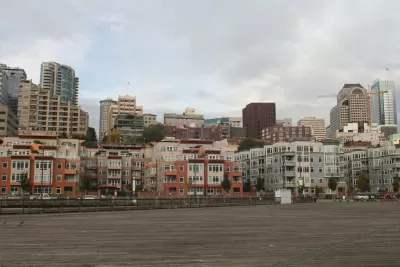The mayor and a councilmember both made potentially sweeping proposals to address displacement as the city moves forward with plans to upzone neighborhoods, in keeping with the Mandatory Housing Affordability policy.

Seattle Mayor Jenny Durkan recently announced an executive order [pdf] that proposed policies for stemming displacement.
Stephen Fesler reports on the executive order, describing it as "very much an all-hands-on-deck kind of policy platform." Fesler also parses the proposed policies into four themes:
- Implementing a suite of short-term actions in 2019 to address displacement and affordability;
- Pushing the state legislature to provide more resources and tools to provide more housing affordability and reduce displacement;
- Continued commitment to the Equitable Development Initiative (EDI), which helps address issues of displacement and gentrification; and
- Commit to community engagement and interdepartmental collaboration to address displacement.
If you're wondering where the city's Mandatory Housing Affordability (MHA) policy fits into the new proclamation, according to Fesler, "[the] executive order also reaffirms her administration’s commitment to the MHA program with intent to monitor its performance and deliver 6,000 affordable housing units by 2028."
Seattle Councilmember Lisa Herbold released a similar proclamation on the same day, to announce draft legislation "that could provide additional tools for decision-makers to rely upon through the permitting process to reduce displacement risks to residents in areas of the city that are considered to be high risk of displacement and low access to opportunity." Those areas are identified as "Urban Villages" identified in the city's Comprehensive Plan as South Park, Bitter Lake, Rainier Beach, Othello, and Westwood-Highland Park.
In Herbold's case, the legislation is drafted in part as a response to concern about the effects of MHA upzones. Fesler provides a lot of additional analysis about the potential implications of the new legislation vis-à-vis the MHA.
FULL STORY: Mayor Durkan and Councilmember Herbold Each Propose Anti-Displacement Strategies

Alabama: Trump Terminates Settlements for Black Communities Harmed By Raw Sewage
Trump deemed the landmark civil rights agreement “illegal DEI and environmental justice policy.”

Planetizen Federal Action Tracker
A weekly monitor of how Trump’s orders and actions are impacting planners and planning in America.

The 120 Year Old Tiny Home Villages That Sheltered San Francisco’s Earthquake Refugees
More than a century ago, San Francisco mobilized to house thousands of residents displaced by the 1906 earthquake. Could their strategy offer a model for the present?

In Both Crashes and Crime, Public Transportation is Far Safer than Driving
Contrary to popular assumptions, public transportation has far lower crash and crime rates than automobile travel. For safer communities, improve and encourage transit travel.

Report: Zoning Reforms Should Complement Nashville’s Ambitious Transit Plan
Without reform, restrictive zoning codes will limit the impact of the city’s planned transit expansion and could exclude some of the residents who depend on transit the most.

Judge Orders Release of Frozen IRA, IIJA Funding
The decision is a victory for environmental groups who charged that freezing funds for critical infrastructure and disaster response programs caused “real and irreparable harm” to communities.
Urban Design for Planners 1: Software Tools
This six-course series explores essential urban design concepts using open source software and equips planners with the tools they need to participate fully in the urban design process.
Planning for Universal Design
Learn the tools for implementing Universal Design in planning regulations.
Clanton & Associates, Inc.
Jessamine County Fiscal Court
Institute for Housing and Urban Development Studies (IHS)
City of Grandview
Harvard GSD Executive Education
Toledo-Lucas County Plan Commissions
Salt Lake City
NYU Wagner Graduate School of Public Service





























